
Nature
Our goal is to create a biodiversity net gain (BNG) and make a measurable contribution to the natural environment on every development.
Our Approach
Biodiversity Net Gain
Delivering a biodiversity net gain for every new development
Biodiversity net gain (BNG) is an approach to development that aims to leave the natural environment in a measurably better state than it was beforehand. We consider net gain from the early design stages, to make sure that we are retaining and creating the right habitats. To help our design teams achieve this we have developed The Nine Concepts to inform our approach and we work with our ecologists, landscape architects and local Wildlife Trusts to make this happen. We are proud to have led the industry on BNG and set the path for it to become a national legal requirement for new development.
Since we became the first homebuilder to set a commitment to achieve a biodiversity net gain on every site back in 2017, we've designed a biodiversity net gain in the master planning of 57 sites, which combined will create more than 1,200 acres of new or measurably improved natural habitats.
From February 2024, biodiversity net gain has been a legislative requirement for all major homebuilding projects, as part of Government plans to restore the natural environment.
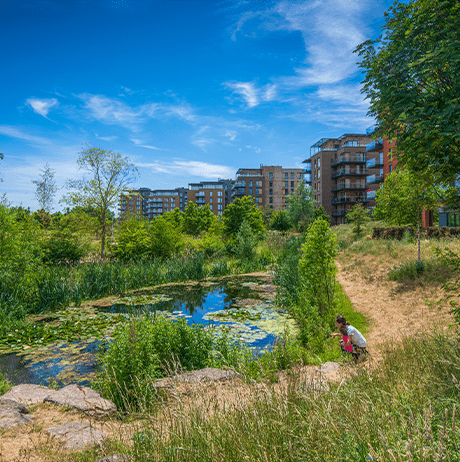
Recognising that the new requirements are still bedding in and that there are some challenges to overcome, we co-chair a BNG Implementation Board with the Department for Environment, Food & Rural Affairs (Defra) via the Future Homes Hub (FHH) to help bring together industry and collaborate on solutions for successfully delivering homes and nature.
Our approach has been highlighted by the Government and others internationally as an example of successfully delivering BNG. We will continue to learn and share knowledge with peers and industry.
This video explores just a few of Berkeley Group’s BNG sites and the many benefits they offer local communities and wildlife.
Environmental Net Gain
Considering climate, pollution, water and ecology
We are extending our existing approach to enhance biodiversity, to explore Environmental Net Gain (ENG). This involves making measurable improvements across other environmental topics on our developments.
To develop our approach to ENG, we have reviewed 27 material environmental issues identified in external tools, policy and our own commitments. We then identified four priority areas where the pressures on the environment are greatest and where we can impact ecosystem services. We are now undertaking trials using external tools.
In partnership with Thames Water, we have explored the concept of water neutrality and how it can be applied to our sites. At Royal Exchange in Kingston, 45,000 litres per day has been offset through the retrofit of local homes, schools and businesses with new water saving devices and measures. Read about our findings in the Thames Water report.
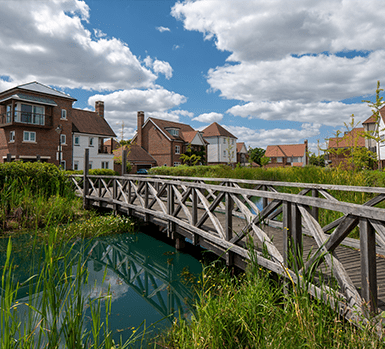
Waste
Using resources efficiently and minimising waste
Each year, the construction industry consumes nearly 400 million tonnes of materials and produces approximately 100 million tonnes of waste. It is the UK’s largest consumer of natural resources and accounts for around a third of UK waste production.
Our Waste Strategy focuses on minimising the waste we generate and maximising reuse, recycling and recovery. At an early stage we work with our designers and consultants to design out waste from our developments, for example by retaining existing structures and reusing materials already available on site.
We set waste targets for our sites, and work with our supply chain partners to increase on-site segregation and opportunities for reuse and recycling, e.g. take-back schemes. Software is used to track waste generation and material deliveries across all live projects to help us gain more oversight and increase contractors’ accountability and ownership of waste, which is proving effective to reduce waste and increase recycling.
We are a partner of the Supply Chain Sustainability School and a member of their Homes and Waste & Resources working groups, which are important forums to share experience and work with contractors, suppliers and other housebuilders to drive improvements across the value chain.

Water
Recognising water as a key resource that needs to be preserved
Berkeley targets an improved internal water efficiency value for our homes compared to building regulation requirements. All homes have a water meter installed and water efficient fixtures and fittings are integrated such as dual-flush toilets and low flow taps.
In addition to our efforts to enhance the water efficiency of our homes, our construction teams are working with contractors to promote water efficient sites. We set water budgets for our sites, offices and sales suites. These give an allowance for water withdrawals that is calculated using a percentage reduction to the previous year, prompting our teams to look for opportunities for continuous improvement.

Timber Certification
Ensuring all timber products come from responsibly managed forests
Berkeley is committed to zero deforestation across our operations and supply chain. Our Sustainable Specification and Procurement Policy requires all timber and wood-based products to be certified to either the Forest Stewardship Council (FSC) or Programme for the Endorsement of Forest Certification (PEFC) scheme. The material tracking software that is in place across all sites, enables us to capture data on all deliveries as they take place. By flagging up non-compliances automatically, the software allows us to take corrective actions before products are installed.
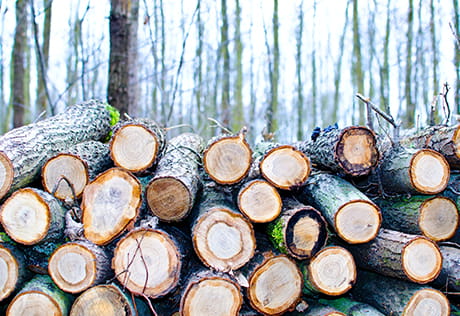
Environmental Management
Undertaking regular sustainability assessments to reduce environmental harm
Our approach to environmental management is underpinned by our Sustainability Management System (SMS), including minimum standards and procedures relating to how business activities are to be managed, from planning through to construction, marketing and handover. The SMS has been developed to ensure all environmental and other relevant legislation is complied with. Through the implementation of the SMS we mitigate risks and aim to create a positive effect on the environment and communities in which we develop.
On-site sustainability assessments are completed by internal sustainability professionals at least quarterly throughout the construction process to identify environmental risks and opportunities, and to audit adherence with the SMS. This process helps to ensure that sites meet legal and planning requirements, whilst also implementing best practice to prevent negative impacts.
We are committed to achieving zero significant or major incidents per year. We provide incident response training to our employees and contractors, and pollution prevention controls and response plans are checked as part of our regular sustainability assessments.

2024/25 Highlights

We've completed over 57 biodiversity net gain strategies to date, including plans for a country park at Eastbrook Village, Milton Keynes

Our biodiversity net gain sites are set to create more than 1,200 acres of new or improved natural habitats

9% reduction in operational water consumption compared to the previous year and homes delivered to an average internal water efficiency of 102.2 litres per person per day

96% of waste diverted from landfill
Awards, Accreditations & Partnerships

Campaign Supporter
Get Nature Positive

Excellence in Habitat Restoration
ESG Edge Awards 2024

Environment Award
Better Society Awards 2024
Latest News
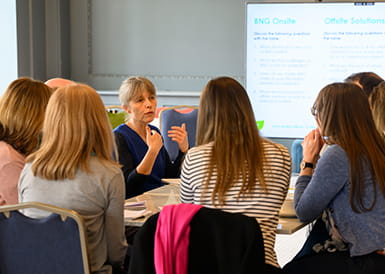
Berkeley Group and Natural England Partner for BNG Workshops
The partners are upskilling organisations to deliver BNG on site.
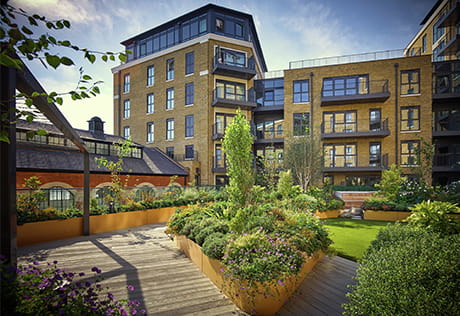
Berkeley and Thames Water Win National Award for Water Neutrality
Berkeley Group and Thames Water made a big splash at the 2023 National Sustainability Awards as they claimed the Water Reduction Award for their pioneering partnership at Royal Exchange, Kingston upon Thames.
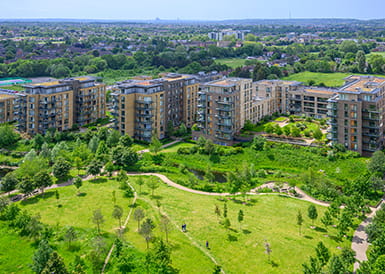
Rob Perrins: Let’s Bring Nature Back to Our Towns and Cities
Berkeley Group were delighted to sponsor the fascinating Create Streets Greening-Up report, launched last week.
